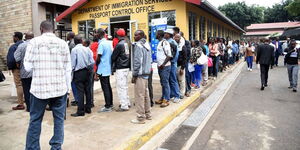The implementation of President William Ruto’s pet project under the Affordable Housing Act faces a fresh challenge as 22 Senators, spearheaded by Busia’s Okiya Omtatah, have brought the battle to court, aiming to quash the Act entirely.
The senators, alongside seven human rights defenders, have pinpointed a Section of the Act appointing the Commissioner General of the Kenya Revenue Authority (KRA) as the collector of the affordable housing levy, as well as sections 4 and 5 imposing the levy, as their primary concerns.
According to the petitioners, the Commissioner General's role is confined to the affairs of the Authority and therefore, cannot serve as the collector of the Affordable Housing Levy. The dispute intensified following President William Ruto's signing of the Affordable Housing Bill 2023 into law on March 19, paving the way for the reinstatement of the housing levy deductions.
Under the new law, Kenyans are subjected to a 1.5 per cent deduction from their gross monthly pay. However, dissenting voices have risen against this move, resulting in a legal battle with potentially far-reaching implications.
Key Questions Raised by the Senators:
Legitimacy
In his petition, Omtatah has questioned the legality of the Affordable Housing law, raising the following questions;
-
Did the failure of the Commission on Revenue Allocation to consider Sections 4 to 7 of the Affordable Housing Bill, 2023, void the resultant Act?
Specifically, the controversy surrounds Sections 4 through 7 of the 2023 Bill, which outlines the implementation of the Affordable Housing Levy, including its imposition at a 1.5% rate on gross salaries and incomes, along with the procedures for its collection and penalties for non-compliance.
-
Are the Government Financial Management (Kenya Slum Upgrading, Low-Cost Housing, and Infrastructure Trust Fund) Regulations, 2006, unconstitutional and void due to being overtaken by the Constitution?
This query extends to the Housing Act (Chapter 117 of the Laws of Kenya), with inquiries if it has been superseded by constitutional provisions, thereby rendering it ineffective or invalid. The Act under scrutiny is foundational to the Kenya Slum Upgrading, Low-Cost Housing, and Infrastructure Trust Fund, which is designed to be financed through various sources, including parliamentary appropriations and donations.
-
Further complicating matters, senators are seeking judicial guidance on whether the Affordable Housing Act of 2024 infringes on the earlier Housing Act by duplicating its functions, thus questioning the new Act's legitimacy.
Another point of contention is the constitutionality of the 1.5% Affordable Housing Levy rate, questioning whether imposing a separate tax on Kenyans for housing finance is legally sound.
-
Lastly, the petitioners argue that it is premature to commence levy collection before the Affordable Housing Fund is fully operational, citing a specific section of the Act that emphasizes the need for the Board to approve financial estimates before revenue collection begins.
This aspect underscores the broader debate on the procedural and constitutional validity of implementing the Affordable Housing Levy and the roles of various entities in its administration.
Public Participation
Omtatah, who protested the lack of public participation in the bill by refusing to appear during the debate on the floor, questions the Senate's oversight in ensuring sufficient public engagement in the Affordable Housing Bill, 2023, compromises the constitutional validity of the Bill's enactment process.
On March 4, the Kisumu High Court dismissed a case aimed at halting the Parliament's consideration of the Affordable Housing Bill, citing adequate public involvement in the legislative process. The court deemed the case premature, observing that it was based on the assumption that the National Assembly would rely solely on written submissions for public input.
The activist is also calling for scrutiny over whether the Senate neglected its duty to safeguard the principle of devolution by approving the Affordable Housing Bill of 2023.
Omtatah is challenging the court to examine the role of the Senate in upholding devolution and to determine if the Council of Governors abandoned its responsibility to defend devolved powers by not advocating against the Bill.
Way Forward
Omtatah wants the judiciary to provide directions on whether;
- It is permissible for ongoing affordable housing initiatives to continue under laws deemed unconstitutional? Further questioning whether "it is within the powers of the national executive to enact regular legislation that amends the Constitution to broaden rights and freedoms."
-
Does the lack of individual benefits from contributions to the fund contravene Article 40 of the Constitution, which prohibits the State or any individual from arbitrarily taking any property or limiting rights to property without adherence to specific lawful processes and compensations?
Article 40 details protections against the arbitrary deprivation of property, stating that Parliament cannot pass a law allowing such actions without due process, especially if it discriminates based on the criteria set in Article 27 (4).
It further outlines conditions under which property may be lawfully expropriated: for public use or benefit, with immediate and fair compensation, and allowing property owners legal recourse.
-
Given these considerations, Omtatah wants the court to provide directions on whether the national government should be obligated to reimburse all deductions made under the Finance Act of 2023?
Moreover, can the Affordable Housing Act of 2024 retroactively validate deductions previously made under the Employment Act of 2007, and should the national government return all funds collected under the Finance Act of 2023?
The petitions filed in court come after the first deductions of the Affordable Housing were remitted in March and the government has not issued any indications of slowing down.
President Ruto has pledged to continue the project despite the legal protests, with the Kenya Kwanza government having won the first round of the court battle that resulted in him using the parliament route to introduce the law.












